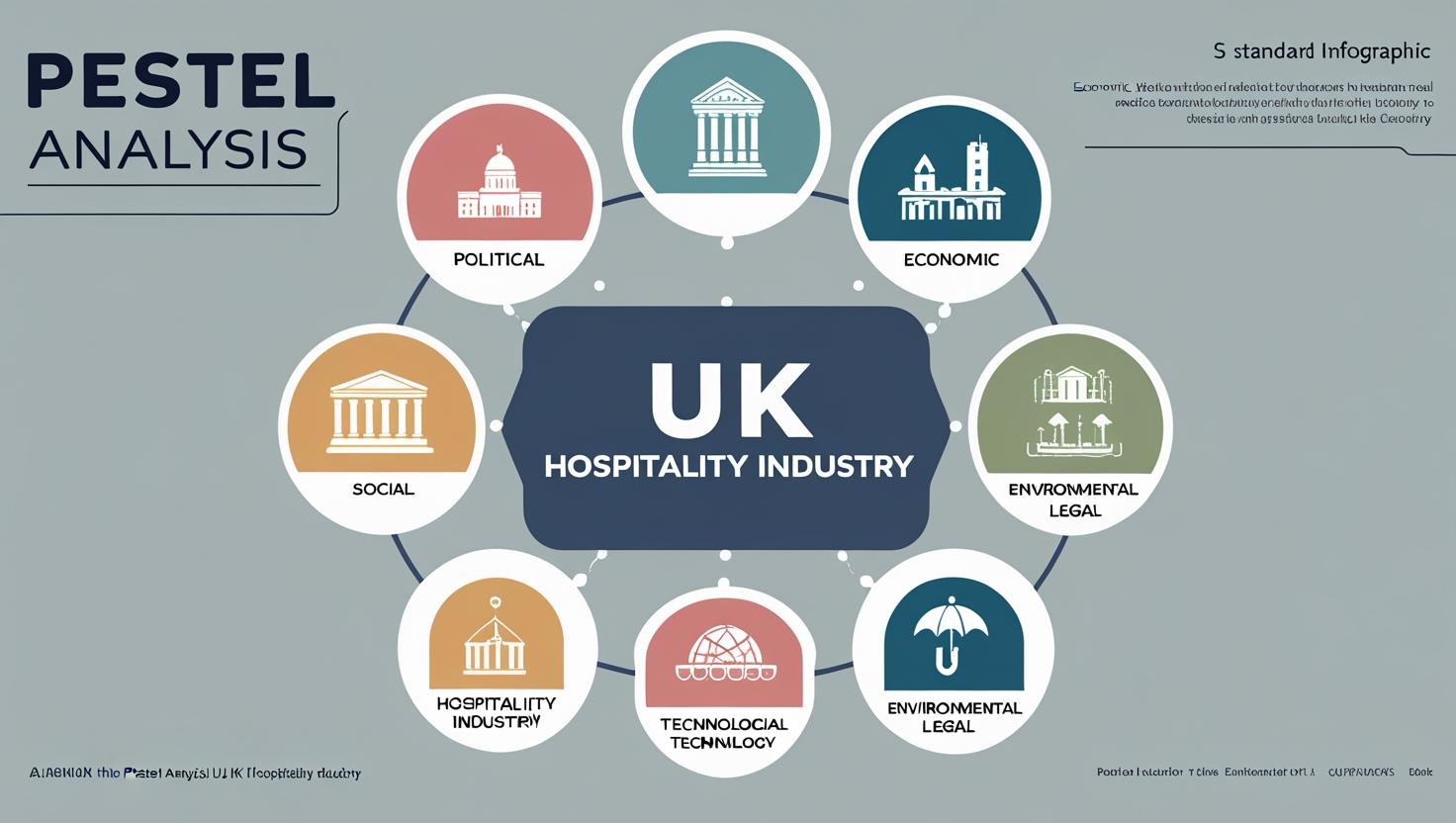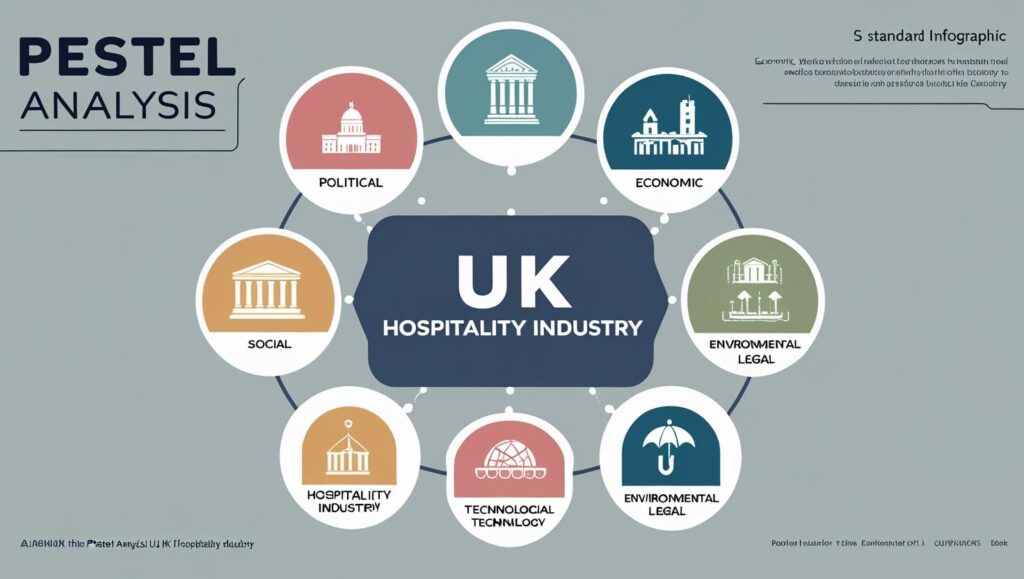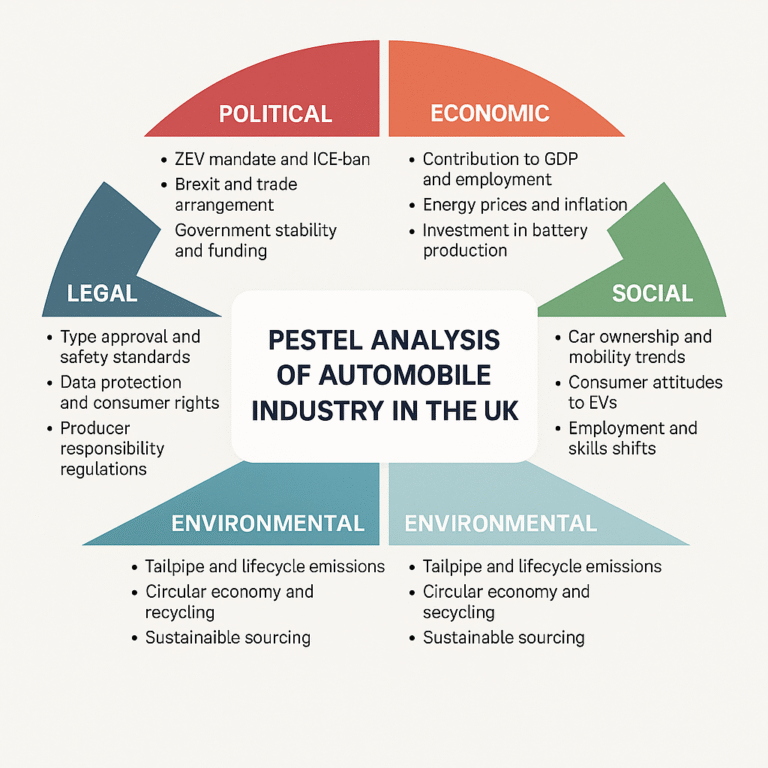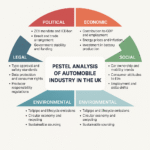PESTEL Analysis Summary: Hospitality Industry in the UK
The UK hospitality industry is shaped by a dynamic mix of political, economic, social, technological, environmental, and legal factors. Politically, the sector is affected by post-Brexit labour laws and government support schemes, while economically, it faces inflation, rising costs, and shifting consumer spending habits. Social trends show increasing demand for sustainable, health-conscious, and experience-driven services. Technological advancements in automation, digital booking, and AI are transforming operations and guest interactions. Environmentally, the industry is under pressure to reduce waste, carbon emissions, and water use, in line with growing consumer expectations and regulatory demands. Legally, strict regulations around food safety, employment, licensing, and data protection require continuous compliance. Overall, the industry must remain agile, sustainable, and customer-focused to thrive in this evolving landscape.
Political Analysis of the Hospitality Industry in the UK
The UK hospitality industry is significantly influenced by political decisions and government policies. As a major contributor to the UK economy, employing over 3 million people and generating billions in revenue, the sector’s success is tightly interlinked with political stability, regulation, and international relations. This analysis explores the political factors affecting the industry, including government legislation, Brexit, labor laws, public health policy, and international trade relations.
1. Government Policy and Regulation
The UK government plays a pivotal role in shaping the business environment for hospitality. Key areas of regulation include:
- Licensing laws: Businesses must comply with strict rules on alcohol sales, opening hours, and food safety.
- Planning and zoning: Local councils regulate where hotels, restaurants, and bars can operate.
- Business rates: High commercial property taxes can burden hospitality businesses, particularly in central urban areas.
Government support during the COVID-19 pandemic, such as furlough schemes and hospitality VAT cuts, showcased how policy can cushion the industry during crises. However, as these supports wind down, many businesses are vulnerable to cost pressures and debt.
2. Impact of Brexit
Brexit has had profound implications for the UK hospitality industry:
- Labour shortages: With the end of freedom of movement from the EU, many hospitality businesses face severe staff shortages. Previously, a large portion of the workforce came from EU countries.
- Supply chain disruption: Delays at borders and increased paperwork have affected the supply of goods, especially perishable food and wine from the EU.
- Cost increases: Import tariffs and weaker exchange rates have led to rising costs for imported goods and ingredients.
While some proponents argue that Brexit offers regulatory flexibility, the industry has largely viewed it as a destabilizing force.
3. Employment Law and the National Minimum Wage
The hospitality industry is labour-intensive and highly sensitive to employment regulation. Key political decisions in this area include:
- National Minimum Wage (NMW) and National Living Wage (NLW): Regular increases in wage thresholds impact profitability, especially for small businesses.
- Working time regulations: Requirements around breaks, hours, and holidays can add operational complexity and cost.
- Immigration policy: Post-Brexit immigration rules restrict access to low-skilled foreign workers, exacerbating staffing challenges.
Government policies on apprenticeships and training incentives also influence workforce development, a growing issue given recruitment difficulties.
4. Public Health and Safety Regulation
Government health initiatives affect hospitality in several ways:
- Calorie labeling: New rules require many restaurants to display calorie counts, which can involve operational costs and affect customer choices.
- Alcohol regulation: Pricing and licensing policies, including potential minimum unit pricing and local restrictions, can impact pubs and nightclubs.
- COVID-19 recovery measures: Ongoing expectations for cleanliness, ventilation, and contactless services have added operational costs and complexity.
5. Local Government and Devolution
Local political leadership, particularly in devolved regions like Scotland, Wales, and Northern Ireland, also shapes hospitality regulation:
- Scotland: Has introduced stricter alcohol laws and minimum pricing.
- Wales: Sets its own COVID and health rules, which can differ from England.
- Greater London Authority and Metro Mayors: Play key roles in licensing, urban development, and supporting tourism.
Fragmented rules across the UK can complicate operations for chains and franchises operating in multiple regions.
6. International Relations and Tourism Policy
The UK’s diplomatic relationships influence inbound tourism, which is vital for hospitality:
- Visa policies: Restrictive visa rules may deter visitors, especially from emerging markets.
- Trade agreements: Post-Brexit trade deals can influence the cost and availability of imported goods, wine, and specialty products.
- Global perceptions: Political stability, security, and the UK’s global image affect international visitor numbers.
Government investment in “VisitBritain” and tourism campaigns can help stimulate demand, especially after the COVID-19 downturn.
Economic Analysis of the Hospitality Industry in the UK
The UK hospitality industry is a vital part of the national economy, encompassing hotels, restaurants, pubs, bars, cafes, and tourism-related services. It generates over £130 billion in annual revenue and supports more than 3 million jobs. However, the industry is highly sensitive to macroeconomic factors. This economic analysis examines the key influences shaping the current and future performance of the UK hospitality sector.
1. Contribution to GDP and Employment
- GDP Impact: Hospitality contributes around 5% to the UK’s GDP. It is one of the fastest-growing sectors, playing a crucial role in regional development and tourism.
- Employment: Pre-pandemic, the industry employed about 3.2 million people — around 10% of the UK workforce. It remains one of the largest employers, especially of young people, part-time workers, and migrant labor.
- Multiplier Effect: The sector supports supply chains in food production, logistics, entertainment, and tourism, magnifying its economic impact.
2. Consumer Spending and Disposable Income
- Demand Sensitivity: Hospitality is highly elastic — demand rises and falls with changes in consumer confidence and disposable income.
- Cost-of-Living Crisis: High inflation and rising interest rates since 2022 have led to reduced discretionary spending. Consumers are cutting back on dining out, travel, and entertainment.
- Shift in Preferences: Post-pandemic, there’s growing demand for experiences over material goods. Consumers are favoring staycations, wellness tourism, and premium casual dining.
3. Inflation and Input Costs
- Rising Costs: The sector faces inflationary pressures on food, energy, wages, and rent. Key cost drivers include:
- Food inflation due to global supply chain issues and climate events.
- Increased utility costs post-Ukraine conflict.
- Wage growth to attract scarce labor.
- Menu Pricing: Many businesses are passing costs on to consumers, which can dampen demand and reduce competitiveness.
4. Labour Market and Wage Pressures
- Staff Shortages: Brexit and the pandemic caused a mass exodus of EU workers. The industry struggles to fill roles, especially in kitchens, housekeeping, and front-of-house.
- Wage Growth: Rising National Minimum and Living Wages place pressure on small operators, particularly those in rural or low-margin areas.
- Training & Retention: Investment in apprenticeships and digital upskilling is becoming a priority to address structural workforce shortages.
5. Tourism and Exchange Rates
- Inbound Tourism: The UK attracts millions of international tourists, particularly from the EU, US, and China. Tourism spending supports hotels, attractions, and restaurants.
- Exchange Rate Volatility: A weaker pound makes the UK more attractive to foreign tourists but increases import costs for ingredients and wine. The dual impact is complex:
- Positive for tourism operators.
- Negative for businesses reliant on imported goods.
6. Access to Finance and Investment
- Post-Pandemic Recovery: Many businesses emerged from COVID with high debt levels, making them vulnerable to rising interest rates and credit tightening.
- Bank Lending: Smaller hospitality businesses often struggle to access favorable financing. Larger groups rely more on equity and private investment.
- Capital Investment Trends: There is growing investment in:
- Tech (e.g., online booking, digital menus, automation).
- Sustainability (energy efficiency, waste reduction).
- Expansion of budget and mid-market offerings.
7. Regional Economic Disparities
- London vs. Regions: London remains the strongest market, benefiting from international tourism and high spending. However, growth is rising in regions like the North West and South West, partly driven by staycations.
- Levelling Up Agenda: Government investment in infrastructure and tourism in regions may boost demand for hospitality outside the capital.
Social Analysis of the Hospitality Industry in the UK
The hospitality industry is heavily shaped by social trends, behaviors, and cultural dynamics. As a service-oriented and people-driven sector, understanding changing demographics, consumer expectations, lifestyle preferences, and societal values is essential for businesses to stay relevant. This analysis explores the key social factors currently influencing the UK hospitality industry.
1. Changing Consumer Preferences
- Experience Over Possessions: Consumers, especially Millennials and Gen Z, increasingly value experiences — dining out, travel, and entertainment — over material goods. This trend benefits experiential offerings like boutique hotels, pop-up dining, and immersive events.
- Health-Conscious Lifestyles: There is rising demand for:
- Organic and locally sourced food.
- Vegan and plant-based menus.
- Calorie transparency and allergen information.
- Customization and Personalization: Consumers expect personalized services, flexible menus, and tailored guest experiences.
2. Demographic Shifts
- Ageing Population: The UK has a growing over-65 population, creating demand for accessible hospitality services, quiet environments, and wellness-focused experiences.
- Young Professionals & Urban Living: In cities, younger consumers with fast-paced lifestyles seek convenient, tech-enabled options — such as grab-and-go, app-based ordering, and digital reservations.
- Cultural Diversity: The UK’s diverse population supports a wide range of cuisines and dining styles. Hospitality businesses catering to ethnic communities or fusing global flavors are thriving.
3. Work-Life Balance and Social Habits
- Flexible Working and Remote Work: Hybrid and remote work models have reshaped demand patterns:
- Reduced weekday lunchtime trade in city centers.
- Increased footfall in suburban and rural hospitality venues.
- Rise of “Third Spaces”: Cafés, co-working-friendly lounges, and casual venues are being used as informal meeting spaces for remote workers and freelancers.
4. Ethical and Social Responsibility Expectations
- Sustainability: Consumers expect businesses to:
- Reduce food waste.
- Eliminate single-use plastics.
- Support sustainable farming and supply chains.
- Community Engagement: Local sourcing, hiring from local communities, and social initiatives (e.g., food donations, training programs for disadvantaged groups) are increasingly valued by the public.
- Transparency and Authenticity: Social media culture and online reviews put pressure on hospitality brands to be transparent and consistent in their practices.
5. Digital Influence and Social Media
- Online Reviews and Reputation Management: Platforms like TripAdvisor, Google Reviews, and Yelp play a critical role in shaping consumer decisions. Negative reviews can quickly damage a business.
- Influencer Marketing: Instagram and TikTok drive footfall to “trendy” spots, especially among younger demographics. Hospitality businesses are leveraging influencer partnerships and photogenic spaces to attract customers.
- Mobile Expectations: Customers expect mobile ordering, digital loyalty programs, and real-time booking — driven by a mobile-first culture.
6. Social Inclusion and Diversity
- LGBTQ+ and Inclusivity: Consumers expect welcoming, inclusive environments. Venues are being assessed not just on service, but on how safe and inclusive they feel for diverse groups.
- Accessibility: There is increasing focus on physical accessibility (e.g., wheelchair access, braille menus), neurodiversity awareness, and inclusive customer service.
7. Impact of COVID-19 on Social Behavior
- Hygiene Consciousness: The pandemic permanently changed public expectations regarding cleanliness, ventilation, and contactless service.
- Shift in Social Norms: People are more selective about when and where they go out. Many prioritize quality, safety, and meaningful interactions over casual or routine outings.
Technological Analysis of the Hospitality Industry in the UK
Technology is reshaping every aspect of the UK hospitality industry—from guest experiences to operations, marketing, and back-end efficiency. Businesses that adopt digital innovation are gaining competitive advantages through improved service delivery, cost reduction, and data-driven decision-making. This analysis outlines key technological developments and their impact on the sector.
1. Digital Transformation and Automation
- Booking Systems: Most hospitality businesses now use cloud-based booking engines, integrated with websites and third-party platforms (e.g. Booking.com, Expedia).
- Property Management Systems (PMS): Hotels rely on PMS for room allocation, guest profiles, and revenue management.
- Restaurant Management Tech: POS systems, digital ordering tablets, and integrated inventory tools are streamlining operations in F&B outlets.
- Automation:
- Self-check-in kiosks and digital room keys are common in hotels.
- QR code menus and contactless payments are standard in restaurants.
- Chatbots are used for handling FAQs and basic bookings.
2. Mobile Technology and Customer Interaction
- Mobile-first Expectations: Consumers expect mobile-friendly booking, ordering, and payment options.
- Hospitality Apps: Many venues have custom apps offering:
- Table reservations
- Loyalty rewards
- In-app ordering
- Digital Wallets: Adoption of Apple Pay, Google Pay, and contactless cards has surged post-pandemic.
3. Artificial Intelligence (AI) and Data Analytics
- Personalisation: AI-driven recommendation engines offer tailored suggestions based on guest preferences and behaviors.
- Revenue Management: Dynamic pricing models use AI to adjust room rates or menu pricing based on demand, seasonality, and competition.
- Customer Feedback Analysis: NLP tools process online reviews and feedback to highlight trends and service gaps.
- Chatbots and Virtual Assistants: AI tools are handling reservations, answering FAQs, and improving response times.
4. Internet of Things (IoT) and Smart Hospitality
- Smart Rooms: Guests can control lighting, temperature, and entertainment using mobile apps or voice assistants (e.g., Alexa for Hospitality).
- Energy Efficiency: IoT-enabled thermostats and lighting systems help reduce energy waste and operating costs.
- Predictive Maintenance: Sensors alert staff when appliances or systems need maintenance, preventing breakdowns and reducing downtime.
5. Cybersecurity and Data Protection
- GDPR Compliance: As hospitality businesses collect sensitive guest data, compliance with data protection laws is essential.
- Cyber Threats: Increased reliance on digital systems makes hospitality businesses vulnerable to hacking, phishing, and ransomware.
- Secure Payments: Encryption, tokenization, and secure gateways are vital for protecting customer transactions.
6. Social Media and Digital Marketing Tools
- Targeted Advertising: Businesses use Google Ads, Facebook, Instagram, and TikTok to reach specific demographics.
- User-Generated Content: Guests frequently share experiences online. Encouraging check-ins, reviews, and photos can boost visibility.
- Reputation Management Platforms: Tools like Trustpilot and TripAdvisor analytics help businesses monitor brand sentiment and respond to reviews in real time.
7. Emerging Technologies
- Augmented Reality (AR) & Virtual Tours: Some hotels and venues offer virtual walkthroughs or immersive previews for event spaces and suites.
- Robotics: Still limited in the UK, but robots are beginning to appear in cleaning, room service, and concierge roles in some high-tech hotels.
- Blockchain: Though still in early stages, blockchain could impact secure payments, ID verification, and loyalty programs in the future.
Environmental Analysis of the Hospitality Industry in the UK
The hospitality industry in the UK is under increasing scrutiny for its environmental impact. Consumers, regulators, and investors are demanding greener operations, and sustainability has become a competitive differentiator. As climate change intensifies and environmental regulations tighten, businesses in the hospitality sector must adapt by reducing their carbon footprint, waste, and resource consumption. This analysis explores the key environmental factors influencing the UK hospitality industry.
1. Climate Change and Carbon Emissions
- Rising Energy Demands: Hotels, restaurants, and pubs are energy-intensive, using large amounts of electricity and gas for heating, cooling, lighting, and kitchen equipment.
- Carbon Footprint Awareness: There’s increasing pressure to reduce emissions through:
- LED lighting, efficient HVAC systems
- Renewable energy adoption (e.g., solar panels)
- Offsetting schemes and carbon labeling
- Climate Risk Resilience: Extreme weather events (floods, heatwaves) threaten tourism patterns, building integrity, and operational stability, especially in coastal or rural locations.
2. Waste Management and Recycling
- Food Waste: The UK hospitality industry wastes over 1 million tonnes of food annually. Businesses are under pressure to:
- Reduce portion sizes
- Improve inventory management
- Donate surplus food or convert it into compost or energy
- Packaging Waste: The sector is a major contributor to single-use plastics. Efforts are growing to eliminate plastic straws, cutlery, and packaging in favor of biodegradable or reusable alternatives.
- Recycling: Many businesses now implement in-house waste separation systems, partnering with waste management firms to improve recycling rates.
3. Water Usage and Conservation
- High Water Consumption: Hotels, kitchens, and laundries consume significant water. Environmental concerns are pushing the adoption of:
- Low-flow taps and showers
- Greywater recycling systems
- Smart water monitoring technologies
- Legislative Pressure: UK water utility companies and regulators are pushing for sustainable water management, particularly in areas prone to drought.
4. Sustainable Sourcing and Supply Chains
- Local and Seasonal Ingredients: Many restaurants and hotels are shifting to locally sourced produce to reduce food miles and support community farming.
- Ethical Supply Chains: There’s growing emphasis on sourcing from suppliers that follow ethical and sustainable practices, especially in seafood, meat, and coffee.
- Sustainability Certifications: Businesses increasingly seek eco-labels like Green Tourism, BREEAM, or Sustainable Restaurant Association membership to signal their environmental commitment.
5. Sustainable Building and Design
- Green Building Standards: New hospitality developments are increasingly being designed with energy efficiency in mind, following standards like:
- BREEAM (Building Research Establishment Environmental Assessment Method)
- Passive House certifications
- Retrofitting Older Buildings: Historic hotels and pubs are investing in insulation, smart thermostats, and double glazing to meet environmental targets while preserving heritage features.
6. Consumer Expectations and Eco-Conscious Travel
- Green Consumerism: A growing number of consumers actively seek eco-friendly options, such as:
- Hotels with sustainability initiatives
- Restaurants with vegan/low-carbon menus
- Low-impact travel and “staycation” choices
- Transparency Demands: Guests want to know what hotels and restaurants are doing to reduce environmental harm. Clear, honest communication about initiatives is essential.
7. Government Regulation and Net Zero Targets
- UK Net Zero by 2050: The hospitality industry is expected to align with national carbon reduction goals.
- Environmental Regulations:
- Energy Performance Certificates (EPCs) for buildings
- Mandatory food waste reporting and packaging reforms
- Incentives for green energy and penalties for high emissions
- Sustainable Tourism Strategy: The UK government encourages eco-tourism and sustainable development practices, especially in National Parks and heritage sites.
Legal Analysis of the Hospitality Industry in the UK
The UK hospitality industry is governed by a wide range of laws and regulations that affect everything from food safety and employment to alcohol licensing and health protocols. Legal compliance is essential not only to avoid fines and reputational damage but also to maintain operational stability and customer trust. This analysis outlines the key legal factors influencing the sector.
1. Employment and Labour Law
- Minimum Wage Legislation: The UK government mandates a National Minimum Wage (NMW) and National Living Wage (NLW), with annual increases that significantly impact labour costs in this wage-sensitive industry.
- Working Time Regulations:
- Employees are entitled to breaks, paid holidays, and a maximum 48-hour working week (unless opted out).
- Right to Work & Immigration Laws:
- Post-Brexit immigration laws require proper work permits for non-UK staff.
- The points-based immigration system has made hiring overseas workers more complex, contributing to labour shortages.
- Equality and Anti-Discrimination:
- Hospitality businesses must comply with the Equality Act 2010, ensuring fair treatment regardless of age, gender, race, disability, or sexual orientation.
2. Health and Safety Regulations
- Health and Safety at Work Act 1974: Employers are legally required to ensure the safety and well-being of staff and customers.
- COVID-19 Legacy:
- Although most restrictions have been lifted, businesses must still adhere to cleanliness, ventilation, and risk assessment protocols.
- Risk Assessments: Venues must regularly assess and mitigate hazards (e.g., fire, slips, food hygiene risks).
3. Food Safety and Hygiene
- Food Safety Act 1990 & Food Hygiene Regulations: All food businesses must:
- Register with their local authority.
- Maintain strict hygiene standards.
- Implement HACCP (Hazard Analysis and Critical Control Points) systems.
- Allergen Labelling (Natasha’s Law):
- As of October 2021, prepacked food must include full ingredient lists with allergenic ingredients clearly highlighted.
- This law has increased responsibility for accurate labelling and staff training.
4. Alcohol and Licensing Laws
- Licensing Act 2003: Hospitality venues serving alcohol must hold:
- A premises licence (for the location).
- A personal licence (for the individual responsible).
- Licensing Conditions:
- Include specific hours of operation, noise control, age verification, and security measures.
- Local Authority Oversight: Breaches can result in fines, licence suspension, or closure.
5. Consumer Protection and Trading Standards
- Consumer Rights Act 2015:
- Customers have the right to fair treatment, accurate descriptions, and quality service.
- Misleading advertising or failing to deliver promised services can lead to legal claims.
- Deposit and Cancellation Policies: Must be clearly communicated and not unfairly disadvantage consumers.
6. Environmental Regulations
- Waste Disposal & Recycling Laws:
- Hospitality businesses must properly dispose of commercial waste and comply with recycling standards.
- Plastic Packaging Tax (2022):
- Applies to businesses using plastic packaging with less than 30% recycled content.
- Energy Performance Requirements: Certain types of properties must meet minimum EPC (Energy Performance Certificate) ratings to operate legally.
7. Data Protection and GDPR Compliance
- General Data Protection Regulation (GDPR):
- Affects how businesses collect, store, and use customer data (e.g., for loyalty schemes, marketing, reservations).
- Non-compliance can lead to fines and legal action.
- CCTV and Surveillance:
- Use of CCTV must comply with data privacy laws and be justified under security or safety grounds.
8. Industry-Specific Legal Obligations
- Hotel Fire Safety (Regulatory Reform Order 2005): Hotels must have up-to-date fire risk assessments and implement evacuation procedures.
- Tourism-Related Regulations: Providers of short-term rentals (like Airbnb hosts) are increasingly subject to planning, insurance, and safety regulations, especially in major cities like London and Edinburgh.
Conclusion
The hospitality industry in the UK operates within a complex and rapidly evolving macro-environment. Political uncertainty, economic challenges, and labour shortages continue to test resilience, while shifting social values and environmental expectations are demanding more agile, ethical, and sustainable business models.
Technology plays a dual role as both an enabler and disruptor, requiring continuous investment and digital literacy. Meanwhile, strict legal and regulatory frameworks underscore the need for robust compliance and proactive governance.
Businesses that succeed will be those that adapt quickly—leveraging innovation, embracing sustainability, understanding changing consumer needs, and maintaining legal and operational agility. In an increasingly competitive and value-driven market, strategic alignment with PESTEL factors is not just a necessity but a long-term advantage.






